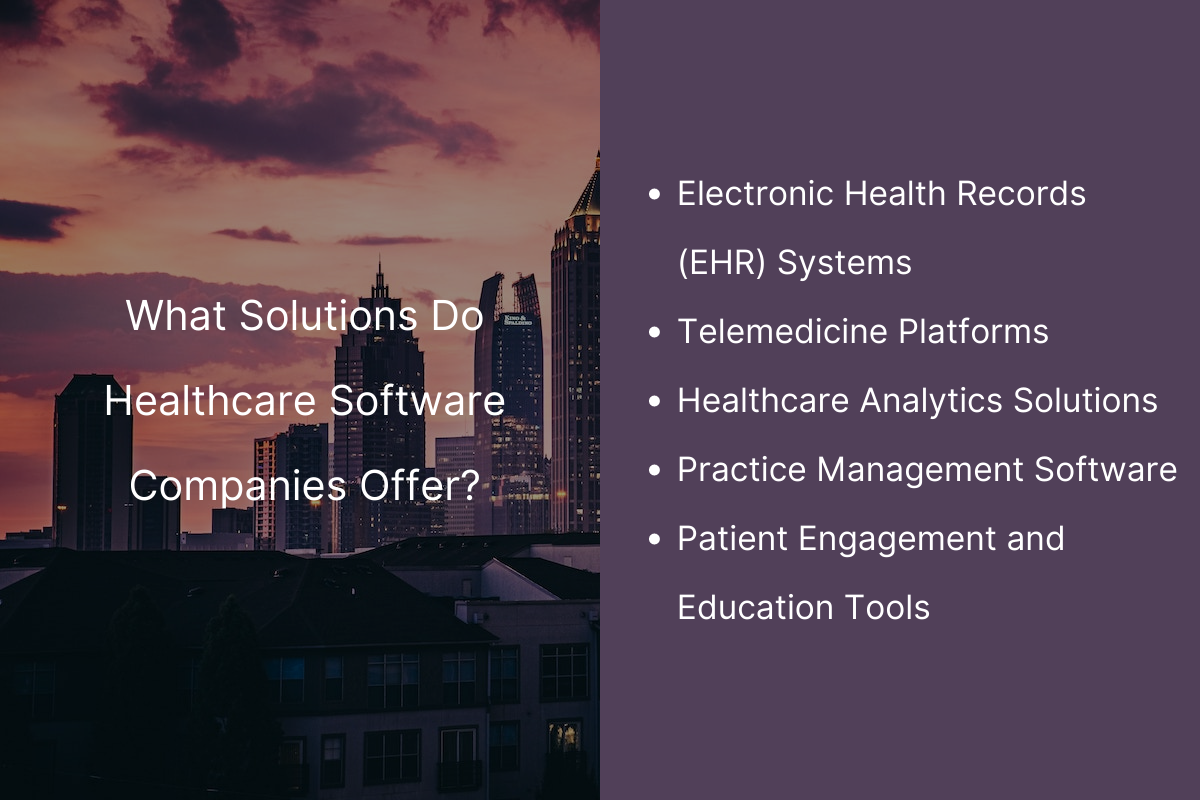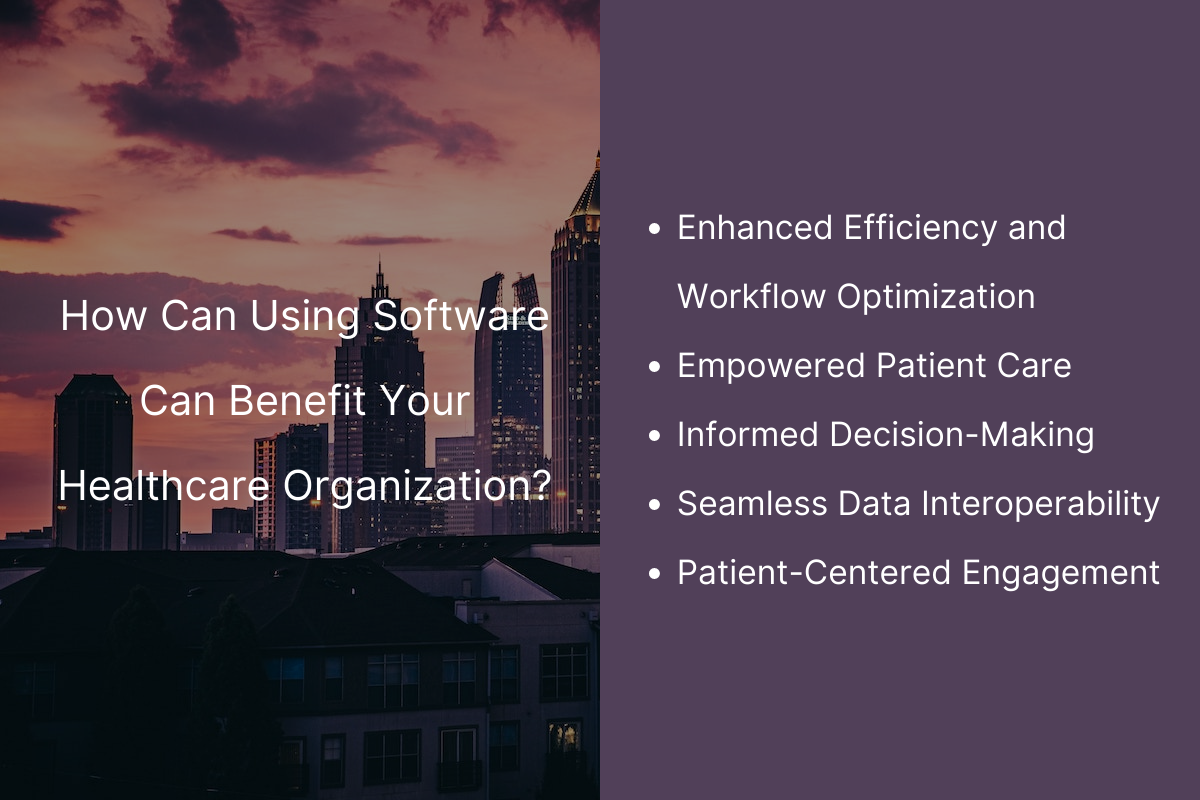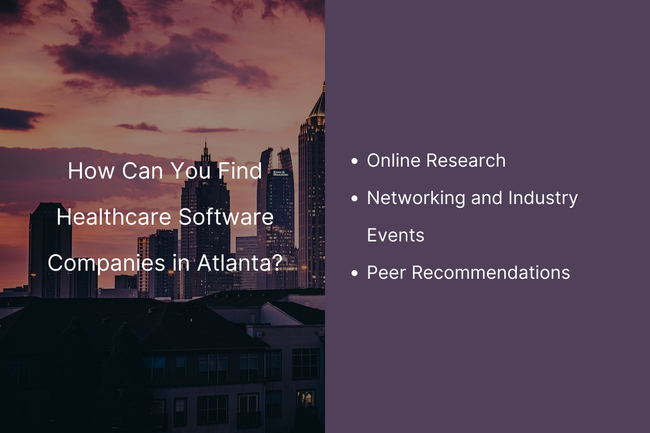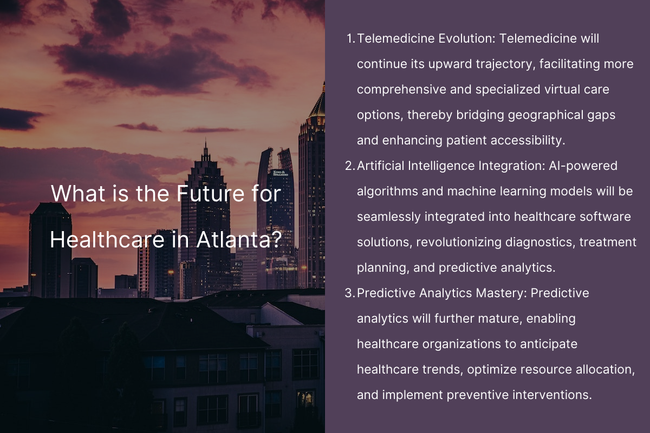In the ever-evolving landscape of healthcare, the role of technology has become increasingly pronounced. Atlanta, a city renowned for its dynamic innovation ecosystem, has emerged as a hub for pioneering healthcare software companies. These trailblazing entities are redefining the contours of the healthcare industry by delivering cutting-edge solutions that enhance efficiency, patient care, and overall healthcare operations. In this article, we embark on a journey into the realm of Atlanta-based healthcare software companies, exploring their transformative impact and the potential they hold for revolutionizing healthcare as we know it.

What Do Healthcare Software Companies Offer?
The realm of healthcare software companies in Atlanta encompasses a diverse spectrum of solutions, each tailored to address specific challenges and optimize various aspects of healthcare delivery. At the forefront of this digital revolution are solutions like:
- Electronic Health Records (EHR) Systems: These comprehensive digital repositories of patient information facilitate seamless data sharing and collaboration among healthcare providers. By digitizing patient records, EHR systems streamline information exchange, minimize errors, and enhance patient safety.
- Telemedicine Platforms: In an era where connectivity is paramount, telemedicine platforms enable healthcare professionals to conduct virtual consultations, monitor patients remotely, and offer telehealth services. These platforms expand access to care, particularly in underserved areas, and empower patients to engage in their health management.
- Healthcare Analytics Solutions: Leveraging the power of data, healthcare analytics platforms offer advanced insights into patient populations, treatment efficacy, and resource utilization. This data-driven approach empowers healthcare providers to make informed decisions, optimize resource allocation, and improve clinical outcomes.
- Practice Management Software: Managing the administrative and operational aspects of healthcare practices is simplified through practice management software. This category encompasses appointment scheduling, billing, and patient communication tools, thereby enhancing the efficiency of healthcare organizations.
- Patient Engagement and Education Tools: Healthcare software companies also develop solutions that foster patient engagement and education. These tools empower patients to take an active role in their health journey, leading to better compliance, improved outcomes, and increased patient satisfaction.
An Overview of Healthcare in Atlanta
Nestled within Atlanta's vibrant innovation ecosystem is a robust healthcare sector characterized by a convergence of cutting-edge medical research, renowned medical institutions, and a commitment to fostering collaboration. With globally recognized healthcare facilities like Emory University Hospital and the Children's Healthcare of Atlanta, the city has established itself as a healthcare powerhouse. This foundation of excellence and innovation provides an ideal backdrop for healthcare software companies to thrive and contribute to the advancement of healthcare delivery.
How Using Software Can Benefit Healthcare Organizations
The integration of software solutions within healthcare organizations yields multifaceted benefits that resonate across the entire spectrum of healthcare delivery:

- Enhanced Efficiency and Workflow Optimization: By automating routine administrative tasks and optimizing workflows, healthcare software solutions free up valuable time and resources. This efficiency translates into improved patient care and reduced operational overhead.
- Empowered Patient Care: Software solutions enable healthcare providers to access comprehensive patient data, leading to more informed diagnoses and treatment decisions. Telemedicine platforms facilitate remote consultations, making healthcare services accessible to a broader patient base.
- Informed Decision-Making: The marriage of healthcare and software equips providers with data-driven insights that guide clinical decision-making. Analytics tools help identify trends, patterns, and correlations within patient data, fostering proactive interventions and personalized treatment plans.
- Seamless Data Interoperability: Interoperability is a cornerstone of modern healthcare software, allowing different systems to communicate and share patient information securely. This interoperability ensures continuity of care and reduces the risk of errors.
- Patient-Centered Engagement: Patient engagement solutions bridge the gap between patients and providers, encouraging active involvement in health management. These tools facilitate communication, educational resources, and appointment scheduling, leading to improved patient outcomes and satisfaction.
What to Look for When Selecting a Healthcare Software Company
When embarking on the journey to select a healthcare software company for your organization, several key factors warrant consideration:
- Proven Expertise and Experience: Evaluate the company's track record in developing and implementing healthcare software solutions. A history of successful projects signifies a deep understanding of the unique challenges in the healthcare landscape.
- Customization Capabilities: Healthcare organizations vary in size, scope, and specialization. An ideal software partner should offer customizable solutions that align with your specific needs and workflows.
- Security and Compliance: Given the sensitive nature of healthcare data, prioritize companies that adhere to stringent security protocols and comply with industry regulations such as HIPAA.
- User-Friendly Interface: The usability of software solutions directly impacts adoption rates. Seek intuitive interfaces that require minimal training and support smooth integration into daily operations.
- Scalability and Future-Readiness: Anticipate future growth and changes in healthcare demands. Partner with a company that can scale its solutions to accommodate your evolving requirements.
How to Find Healthcare Software Companies in Atlanta
Discovering reputable healthcare software companies within the vibrant ecosystem of Atlanta requires a thoughtful and strategic approach, capitalizing on a fusion of online and offline resources. Embark on your quest by emboldening your search through various avenues:
One of the most accessible channels is online research. Navigate through online directories tailored to the healthcare and technology sectors. These repositories of information unveil a myriad of healthcare software companies in Atlanta, each distinct in its offerings and strengths. Traverse industry-specific forums and immerse yourself in technology blogs that delve into the nuances of these companies. As you explore, delve into their portfolios, unraveling the tapestry of their solutions, and delve into client testimonials and illuminating case studies that illuminate their track record. This comprehensive investigation casts a spotlight on their expertise and reliability, guiding your selection process.

Step into the pulse of Atlanta's bustling healthcare and technology scene by participating in networking events and industry gatherings. The city brims with a profusion of healthcare and technology events that convene professionals from diverse domains. Immerse yourself in these gatherings, forging connections with peers who have traversed similar paths. Engaging in conversations and dialogues within these events can be a treasure trove of insights, as you glean recommendations and firsthand accounts from those who have navigated the landscape of healthcare software companies.
A potent strategy lies in seeking guidance from fellow healthcare practitioners and organizations. Establish connections and engage in conversations with those who have harnessed the potential of healthcare software companies. Reach out to peers and organizations, opening doors to candid conversations about their experiences. Peer recommendations bear the weight of authenticity, offering invaluable perspectives that navigate you through the maze of options.
By weaving together these multifaceted approaches—online exploration, networking immersion, and peer consultations—you sculpt a robust framework for unearthing the healthcare software companies in Atlanta that resonate with your objectives. This amalgamation of strategies not only refines your search but also ensures that your partnership with a healthcare software company is founded upon a bedrock of informed decisions and well-sourced insights.
Top Healthcare Software Companies in Atlanta
Accord Systems
Accord Systems specializes in delivering innovative EHR and practice management solutions to healthcare providers. Their software is designed to streamline clinical workflows, enhance patient engagement, and improve overall operational efficiency. The platform offers features such as electronic prescribing, appointment scheduling, billing and claims management, and secure patient communication.
Pros:
- Comprehensive EHR: Accord Systems provides a comprehensive electronic health record system that centralizes patient information, making it easily accessible to healthcare providers.
- Patient Engagement: The software includes tools for patient engagement, such as online appointment scheduling, secure messaging, and access to personal health records.
- Customizable Templates: Users can create customized templates for documentation and note-taking, enabling tailored patient care and streamlined workflows.
- Integration Capabilities: Accord Systems' software can integrate with other healthcare systems, facilitating seamless data exchange and interoperability.
Cons:
- Learning Curve: Some users may experience a learning curve when adapting to the software's features and functionalities.
- Initial Setup: The setup process might require dedicated time and resources to ensure proper configuration and integration with existing systems.
AthenaHealth
AthenaHealth is a widely recognized healthcare technology company that offers a suite of services, including EHR, revenue cycle management, medical billing, and practice management solutions. Their cloud-based platform aims to optimize practice operations, improve financial performance, and enhance patient care.
Pros:
- Cloud-Based Accessibility: AthenaHealth's cloud-based platform allows healthcare providers to access patient data and manage practice operations securely from any location with an internet connection.
- Revenue Cycle Management: The platform integrates revenue cycle management tools to streamline billing, claims processing, and reimbursement, reducing administrative burdens.
- Benchmarking and Analytics: AthenaHealth offers analytics tools that enable healthcare organizations to track performance metrics, compare data against industry benchmarks, and make data-driven decisions.
- Network Effect: AthenaHealth's extensive network facilitates electronic communication and data exchange between healthcare providers, improving care coordination.
Cons:
- Cost Considerations: The pricing structure may vary based on the size and needs of the healthcare organization, potentially leading to cost concerns.
- Integration Complexity: Integrating AthenaHealth's platform with existing systems may require careful planning and support to ensure seamless data migration.
Compliance PT
Compliance PT focuses on developing software solutions that address compliance and regulatory challenges faced by healthcare providers. Their platform offers tools for documentation, scheduling, reporting, and analytics, designed to simplify compliance management and improve patient care quality.
Pros:
- Regulatory Compliance: Compliance PT's software is specifically tailored to help healthcare providers meet regulatory requirements, ensuring adherence to industry standards.
- Documentation and Reporting: The platform streamlines documentation processes, making it easier to track and report on compliance-related activities.
- User-Friendly Interface: The software's intuitive interface facilitates ease of use, allowing healthcare professionals to navigate and utilize the platform effectively.
- Training and Support: Compliance PT provides training and support to help healthcare organizations implement and maximize the use of their software.
Cons:
- Specialized Focus: While Compliance PT's software is valuable for regulatory compliance, it may be less comprehensive in addressing broader practice management and clinical needs.
ER Express
ER Express specializes in developing patient-centered solutions for urgent care facilities and emergency departments. Their software enables online check-in, appointment scheduling, and wait time notifications, enhancing patient experiences and operational efficiency.
Pros:
- Patient Convenience: ER Express's software allows patients to check-in online, reducing wait times and improving patient satisfaction.
- Workflow Optimization: The platform's features contribute to smoother patient flow, enabling healthcare providers to manage patient volumes more effectively.
- Communication Tools: ER Express offers tools for notifying patients about estimated wait times and updates, keeping them informed and engaged.
- Integration with EHR: The software can integrate with existing electronic health record systems, ensuring seamless patient data management.
Cons:
- Limited Scope: ER Express's software is tailored specifically to urgent care and emergency department settings, which may not fully address the needs of other healthcare specialties.
- Adaptation Period: Healthcare staff may require time to adjust to the new workflow facilitated by the software.
NextGen Healthcare
NextGen Healthcare provides a comprehensive suite of solutions encompassing EHR, practice management, revenue cycle management, and population health management. Their platform is designed to enhance clinical decision-making, optimize practice operations, and improve patient outcomes.
Pros:
- Integrated Platform: NextGen Healthcare offers an integrated suite of solutions, enabling seamless data exchange and collaboration across various aspects of healthcare delivery.
- Population Health Management: The platform includes tools for population health management, enabling healthcare organizations to proactively manage patient health and outcomes.
- Interoperability: NextGen Healthcare's software prioritizes interoperability, allowing for data exchange with other healthcare systems and networks.
- Patient Engagement: The platform facilitates patient engagement through features like patient portals, telehealth capabilities, and secure messaging.
Cons:
- Complexity: The extensive features and capabilities of NextGen Healthcare's platform may present a learning curve for users.
- Implementation Challenges: Successfully implementing the software across an organization may require careful planning and resources.
Rhyme
Rhyme focuses on providing telemedicine solutions that enhance remote patient care and communication. Their platform offers video consultations, secure messaging, and appointment scheduling, enabling virtual care delivery and patient engagement.
Pros:
- Telemedicine Capabilities: Rhyme's platform facilitates virtual patient consultations, enabling healthcare providers to offer remote care services.
- Patient-Centered Communication: The software includes secure messaging tools that enable healthcare professionals to communicate with patients in a confidential and convenient manner.
- Convenience and Access: Rhyme's telemedicine platform provides patients with greater access to care, particularly for those who may have mobility or geographical constraints.
Cons:
- Specialized Use: Rhyme's platform primarily focuses on telemedicine capabilities and may not fully address broader practice management and administrative needs.
- Connectivity Considerations: Reliable internet connectivity is essential for seamless telemedicine interactions, which may pose challenges in certain areas.
Trella Health
Trella Health specializes in data-driven solutions that enable healthcare organizations to enhance care coordination and referral management. Their platform offers insights into patient referrals, provider networks, and post-acute care options.
Pros:
- Referral Insights: Trella Health's platform provides valuable insights into referral patterns, enabling healthcare organizations to optimize care coordination and referral management.
- Post-Acute Care Analytics: The software offers data and analytics related to post-acute care options, helping healthcare providers make informed decisions about patient transitions and care pathways.
- Network Optimization: Trella Health's platform can assist in identifying and building effective provider networks, fostering collaboration and enhancing patient care outcomes.
Cons:
- Specialized Focus: Trella Health's platform may be more geared toward care coordination and referral management, potentially leaving out other practice management aspects.
- Learning Curve: Healthcare organizations may need time to become proficient in using the platform to its full potential.
Waystar
Waystar specializes in revenue cycle management and healthcare financial solutions. Their platform offers tools for billing, claims management, revenue optimization, and patient financial engagement.
Pros:
- Revenue Cycle Management: Waystar's platform is dedicated to optimizing revenue cycle processes, including billing, claims processing, and reimbursement management.
- Financial Engagement
: The software includes tools for patient financial engagement, allowing patients to view and manage their financial responsibilities online.
- Analytics and Reporting: Waystar offers analytics and reporting features that enable healthcare organizations to monitor and analyze revenue-related data.
Cons:
- Focused Scope: Waystar's platform primarily addresses revenue cycle management and financial aspects of healthcare operations, potentially requiring integration with other systems for broader functionality.
- Implementation Complexity: Successfully implementing revenue cycle management solutions may require thorough integration and training efforts.
Atlanta's healthcare software landscape is populated with diverse solutions, each catering to unique aspects of healthcare delivery and operations. The featured companies exhibit strengths in areas such as electronic health records, telemedicine, compliance management, revenue cycle optimization, and patient engagement. As healthcare organizations evaluate their software needs, careful consideration of the pros and cons of each solution is essential to selecting the most suitable option that aligns with their goals and requirements.
The Future for Healthcare in Atlanta and Healthcare Software
The horizon for healthcare in Atlanta is illuminated by the promise of sustained innovation and collaborative efforts. The city's healthcare software companies are poised to push the boundaries of technology even further, ushering in a new era of transformative advancements. Foremost among these developments is the evolving landscape of telemedicine. With a continued upward trajectory, telemedicine is set to offer increasingly comprehensive and specialized virtual care options. This progression will effectively bridge geographical divides, granting patients enhanced accessibility to healthcare services, and empowering healthcare providers to reach a wider patient base.
Artificial intelligence (AI) is poised to become an integral facet of healthcare software solutions. The seamless integration of AI-powered algorithms and machine learning models will revolutionize various facets of healthcare delivery. The incorporation of AI stands to redefine diagnostics, facilitating more accurate and efficient identification of medical conditions. Additionally, treatment planning will be imbued with enhanced precision, enabling healthcare professionals to tailor interventions to individual patient needs. The integration of AI will also extend to predictive analytics, where advanced algorithms will attain a state of mastery. This will empower healthcare organizations to anticipate emerging healthcare trends, enabling them to allocate resources optimally and proactively implement preventive interventions.

As the future unfolds, Atlanta's healthcare sector is poised to embrace these remarkable transformations, driven by the collaborative efforts of healthcare professionals and innovative software companies. The convergence of cutting-edge technology and patient-centered care will pave the way for a healthcare landscape characterized by improved outcomes, increased accessibility, and enhanced overall well-being. With a steadfast commitment to progress, Atlanta is positioned to remain a vanguard of innovation in healthcare, continually redefining the boundaries of possibility and reshaping the future of healthcare delivery.
Conclusion
Atlanta's healthcare software companies stand as vanguards of innovation, propelling the healthcare industry toward a future characterized by efficiency, patient-centered care, and data-driven decision-making. By embracing these transformative solutions, healthcare organizations can elevate the quality of care they provide, empower patients to actively participate in their health journey, and position themselves at the forefront of a rapidly evolving healthcare landscape. As Atlanta continues to foster innovation, the synergy between healthcare and software promises a future where optimal patient outcomes are not just a goal, but a realized reality.

